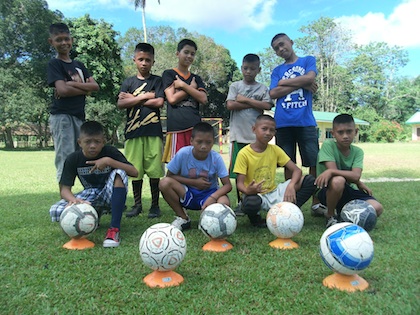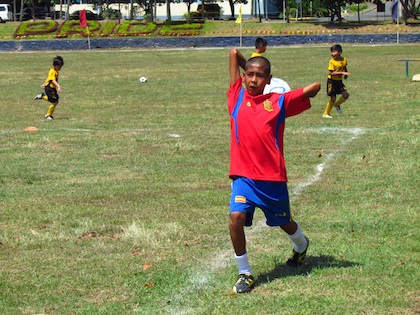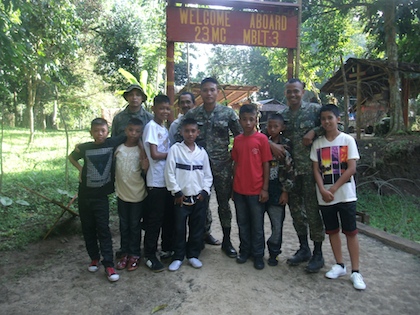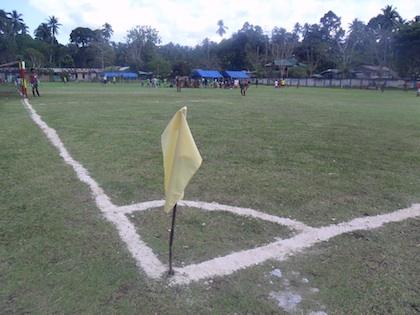SUMMARY
This is AI generated summarization, which may have errors. For context, always refer to the full article.

MANILA, Philippines – On the remote island of Sulu, a lawless land that offers little future for its children, a new project is winning the peace on the football pitch.
For almost two years, the Marines have been teaching the disaffected youth of Sulu how to play the sport in the hopes of encouraging values such as discipline, sportsmanship and teamwork among the children.
The kids, aged 18 and below, take part in regular training sessions almost every day at the Philippine Marine Corps (PMC) detachments located in each district of the island, where they are also taught simple math, reading and writing.
It all began with a few Marines who were kicking a ball around in their spare time, and were asked by a handful of children if they could play and learn the game.
Learning new values
Most of the kids had never even seen a football before, and it took some time before they learned the rules and how to work in a team, Maj Stephen L. Cabanlet, who’s in charge of the project, told Rappler.
“I thought it was a good idea for the children, and we organized everything so we could instill values of discipline and friendship, camaraderie and sportsmanship.”
Cabanlet admitted it took time to teach the kids “even the simplest things, to be humble, patient.”

But the Marines persisted in their efforts and slowly the children caught on.
Some of the kids even went a step further and agreed to play alongside members of an enemy clan, a situation until then almost unimaginable on the war-torn island.
“In Sulu there are many clan wars, one municipality is always against another; but with the game, the children were able to establish friendship,” Cabanlet said. “The most important thing is that now they are able to respect each other. We have never experienced conflict between the children.”
Support from the parents
In the beginning, the Marines were worried at how the families of the kids would view their children chumming with the “enemy” in Sulu, where part of the population has been in conflict for decades with government forces.
Sulu is the birthplace of the Moro National Liberation Front (MNLF), which waged a violent secessionist campaign until it signed a peace pact with the Ramos government in 1994. Today, ex-MNLF rebels in the province who have been integrated into the police and the military run after members of the terrorist Abu Sayyaf Group.
The football program shows that peace has a future in the province.
Because as soon as the parents saw how the youths were making progress in football, they gave their blessing.
“The parents were really grateful for us for starting the program. They say we need to continue because they have seen changes in their children when it comes to their studies and discipline at home,” says Cabanlet.
The only minor problems the officer encountered with the families was when he was tasked with choosing the players who would travel to Manila to participate in the I Football for Peace tournament organized by the PMC last April.
The parents, according to the officer, think “it is better for us to send our children to the Marines, than to something bad” like the armed bandits lurking in the jungle.

Balls, not bullets
“If you go to Sulu, the way of life there is guns. Everywhere in the house there are guns,” Cabanlet said of a place were the local youth is already gambling and smoking at age 8.
That is why “we need to change the perspective from bullets into balls, from fighting in the jungle to fighting on the football field.”
But for that to happen, the kids need more balls to replace the bullets they will not learn how to fire.
“We need more balls. Even if they are barefoot we can still train them,” stressed the major, who explained that the kids need equipment to keep them motivated and further assistance is beyond the capacity of the PMC.
The PMC is currently sponsoring a high school education for two of the best players, a boy and a girl who are currently studying in Zamboanga City.
“For now this is an experiment. Hopefully in the future someone will pledge for their education,” said Cabanlet.

Beyond football, the long-term plan is for the program to provide the children with the opportunity to secure sports scholarships so they can get the education they have no access to in Sulu.
“If not, they will just be there, illiterate, they can’t even read. So how can the play on an international or a national level if they cannot read simple English or speak Tagalog?”
Not their mission
Cabanlet reiterated that he and his fellow Marines are not stationed in Sulu to teach kids how to play football but to fight the outlaws.
“We are supposed to be war fighters, not football teachers.”
Nevertheless, that does not mean the PMC leadership does not support the project.
“They are pushing us to do this program because they believe this is one instrument for getting our objective of peace. We need to work hand in hand, to have the same eyes to see our goal, and the children will be our legacy,” said Cabanlet.
Dreaming of peace
The officer has a dream: to see peace in Sulu and help the children to smile again.
“When you go to some places in Sulu, you may be afraid of the people or even the children. They do not wave or smile. But now the children, when we pass by, they are very happy to see us and smile and wave,” said Cabanlet.
He expressed the hope that one day, a boy from this beautiful island ravaged by violence will grow up to be a professional footballer and maybe even play for the Azkals, the Philippine National Team whose performances in recent years have sparked a new interest in football for many Filipinos.
“Someday, Sulu may produce a member of the Azkals.” – Rappler.com
[All those interested in providing assistance to the program may contact PMC Special Services Officer Major Stephen L. Cabanlet at the Philippine Marine Corps Headquarters, Marine Barracks Rudiardo Brown, Fort Bonifacio, Taguig, call/text +63 906 564 2765 or email cabanlet@yahoo.com]
Add a comment
How does this make you feel?
There are no comments yet. Add your comment to start the conversation.